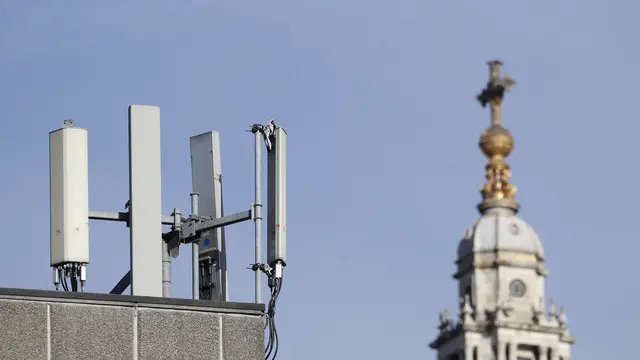
Mobile network phone masts are visible in front of St Paul's Cathedral in the City of London. /AP
Full 5G technology and gigabit broadband could add as much as 51.4 billion pounds ($63.9 billion) to the British economy in five years, and 68.8 billion pounds ($85.53 billion) by 2030, according to a report by telecoms analysts.
The government has previously made its "fiber-by-default" pledge, that would see the UK fully 5G and full-fiber connected by 2025. Fulfilling the pledge would reap great economic benefits, according to research commissioned by Huawei and carried out by Assembly Research, an independent London-based firm.
The UK, despite making significant progress in full fiber connectivity over recent years, has the third-lowest penetration rate among European nations, at just 2.8 percent, according to FTTH Europe, a non-profit organization with a mandate to accelerate ubiquitous, fiber-based connectivity. The report said countries such as France and Spain, which have achieved widespread gigabit coverage, can be models for the UK to follow.
Among the report's policy recommendations was that the government significantly increase subsidies so they get to hard-to-reach "non-commercial" areas of the country. The UK government has already pledged five billion pounds, a figure that remains "modest in the sense of the overall 30 billion pounds the roll-out is expected to cost," according to Assembly.
The British telecoms industry was ready to support the ambitious 2025 target, although it would require a favourable regulatory environment, the report noted.
The majority of the UK's broadband infrastructure is currently Fiber To The Cabinet (FTTC) technology, which uses copper for the final few meters of wiring to make a connection. But now British telecoms giants such as Virgin Media as well as smaller, digitally minded firms, such as Gigaclear are all investing in full-fiber networks.
The speed of the roll-out is crucial. The report notes that even a delay of a year to the UK government's goal of full gigabit coverage by 2025, could mean the UK misses out on 9.7 billion pounds in productivity. Adding that a two-year delay could push that figure to 28.7 billion pounds.
The report was commissioned by Huawei, one the world's largest providers of 5G networks. The Chinese telecom giant has been granted a
limited but still significant
role in developing the UK's 5G network.
 简体中文
简体中文

